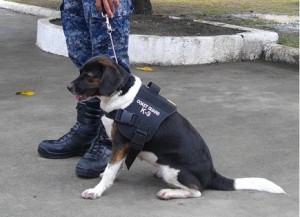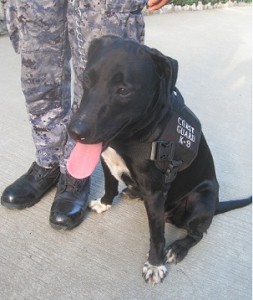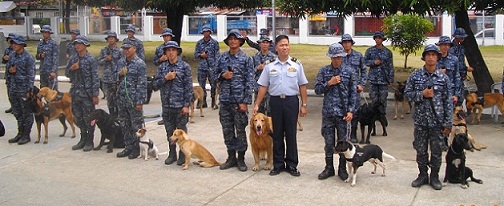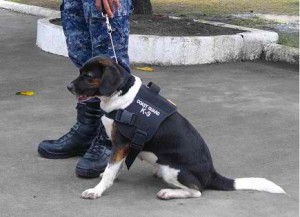By KHRYSTA IMPERIAL RARA
 ASPINS, the Philippine native dogs, are finally making history.
ASPINS, the Philippine native dogs, are finally making history.
Two aspins have graduated with 25 other purebred dogs from the Philippine Coast Guard’s (PCG) K9 school and will be joining the roster of security dogs guarding the country’s ports against smuggled narcotics and bombs.
They proudly trooped to the stage with their handlers to receive their diplomas during a ceremony honouring them at the PCG base camp in Taguig last week.
The PCG is an armed and uniformed unit attached to the Department of Transportation. It is tasked with securing maritime public transport like ships and ferry boats. Detecting drugs and bombs as well as search and rescue operations are part of its job description.
PCG dog handlers also learned water rescue, survival, swimming, scuba diving and first aid. But they first had to go through a rigid screening process.
“We first check to see if they are animal lovers so they would be concerned about the dog who would be their daily companion. They also have to be physically fit and unafraid of being bitten,” PCG Commander Allen J. Dalangin said.
But the dogs were taught only bomb and narcotics detection. “They are not trained to attack because that would be dangerous for the passengers,” he clarified.
Next year, they will begin training dogs for rescue as well as tracking human scent which is necessary in the search for survivors during a calamity.
 The aspins, named Cola and Fiona, successfully passed all tests for the one-year Coast Guard K9 Handlers Course together with a Jack Russell named Joyce, 5 Labradors, 16 Belgian Malinois, 1 German Shepherd, 2 Golden Retrievers.
The aspins, named Cola and Fiona, successfully passed all tests for the one-year Coast Guard K9 Handlers Course together with a Jack Russell named Joyce, 5 Labradors, 16 Belgian Malinois, 1 German Shepherd, 2 Golden Retrievers.
Though they looked friendly, not all the dogs can be hugged and stroked, Dalangin explained. It all depends on their personalities. The Belgian Malinois, for instance, are considered the best security dogs but they can be unpredictable and moody with strangers.
The K9 graduates all stood at attention beside their handlers during the two-hour ceremony but a few decided later to skip the formalities and do what dogs do best.
One Golden Retriever stood on his hind legs as if prodding his handler to play or seek shelter from the heat of the sun. Some dogs lay on the concrete driveway, noses on their handlers’ boots and hind legs apart.
Of the 27 graduates, 20 are bomb sniffers while 7 are trained to look for illegal drugs.
“We have a quota of producing 20% narcotics detection dogs for every batch and we are trying to increase this to 30%,” Dalangin stated.
The bomb sniffers are chosen according to their behaviour, he said.
Hyperactive dogs who excitedly scratch at boxes and containers when they sniff something are trained for narcotics detection because a bomb might go off if there is too much movement around it. For this kind of work, dogs that can calmly sit down once they smell explosive devices are preferred.
Cola and Fiona are the first aspins in Philippine canine history trained to detect bombs. Foreign breeds are traditionally used to detect explosives and illegal drugs because they are known for their intelligence and observation skills.
As an example, Belgian Malinois Narda topped the class because she impressed PCG officers with her 100 percent accuracy rate in narcotics detection. “Belgian Malinois are highly intelligent, very vigilant and observant, and they have high intensity and high endurance,” Lieutenant Commander Famela Aspuria, who is also Officer-in-Charge of the CG Veterinary Service, said.
The aspins were donated by civilians after they heard CG officials announce on television that they would be accepting and adopting local dogs.
PCG officers believe training native dogs would allow them to cut their canine food budget and save on money spent in purchasing foreign breeds. The local dogs are also expected to be more adjusted to tropical weather and therefore be less prone to disease.
The K9 school accepted 38 dogs at the start of the training program last October. Eleven dropped out of the program for various reasons. Three Aspins, namely Pacman, Charice and Arnel, flunked this year because they lacked focus and were a bit moody.
But PCG officials are giving them a second chance and the siblings will be joining the next batch of trainees.
The three dogs, together with their siblings Manny and Pacquiao, were catapulted into instant celebrity status last year after the PCG announced that they were being eyed for security work and were undergoing puppy training at the base camp. This kind of training encourages them to go after the ball being held or thrown by a puppy handler.
Aspin Manny, who was about 3 months old at the time, didn’t seem to have the heart for the game. He would often escape from the puppy pen to go exploring in the garden.
Manny and Pacquiao have since been adopted by Coast Guard personnel. Charice, Arnel and Pacman are still at the base awaiting their next chance at training.
Their mother, Azumi, was adopted by PCG personnel two years ago at the Manila Harbor. The five pups inherited her short legs, stocky build and long nose.
Azumi, meanwhile, had another litter of 7 puppies. One died, five were given away because they lacked “the ball drive”, and one is currently in the puppy training program.
The PCG has so far trained 126 regular working dogs composed of 100 explosive detection and 26 narcotic detection canines.

The new graduates will be deployed in CG K9 port detachments all over the country except for the aspins and the Jack Russell terrier who will be assigned to nearby ports because “the media are always looking for them”, Dalangin said.
Aspins Fiona and Cola will be working in Batangas which is one of the busiest ports in the country due to its 24-hour schedule. Jack Russell Joyce will be assigned with her handler to either the North or South Harbor.
